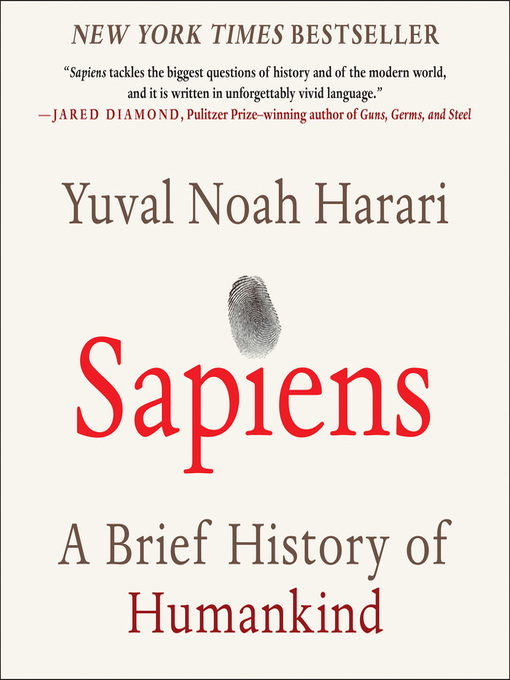-

November 17, 2014
Writing with wit and verve, Harari, professor of history at the Hebrew University of Jerusalem, attempts to explain how Homo sapiens came to be the dominant species on Earth as well as the sole representative of the human genus. He notes that from roughly two million years ago until about 10,000 years ago, we were not the only humans on the planet; many species preceded us, and some overlapped our tenure. Harari argues persuasively that three revolutions explain our current situation. The first, the cognitive revolution, occurred approximately 70,000 years ago and gave us “fictive” language, enabling humans to share social constructs as well as a powerful “imagined reality” that led to complex social systems. The second, the agricultural revolution, occurred around 12,000 years ago and allowed us to settle into permanent communities. The third, the scientific revolution, began around 500 years ago and allowed us to better understand and control our world. Throughout, Harari questions whether human progress has led to increased human happiness, concluding that it’s nearly impossible to show that it has. Harari is provocative and entertaining but his expansive scope only allows him to skim the surface.
-

Starred review from December 1, 2014
This title is one of the exceptional works of nonfiction that is both highly intellectual and compulsively readable. Originally published in Israel in 2011, it has been translated into over 20 languages, including this polished English version. Harari (history, Hebrew Univ. of Jerusalem) takes the reader on a journey that begins with the dawn of Homo sapiens around 200,000 BCE and ends with the scientific revolution. The author covers the cognitive revolution, which allowed Homo sapiens, unlike our predecessors, to imagine what the author terms fictions--gods, laws, the idea of money, and so on. These concepts made it possible for large groups of the species to work together for their greater good. The author goes on to reveal the consequences of the agricultural revolution (beginning around 10,000 BCE) and the scientific revolution in the 16th and 17th century, which include everything from bureaucracy and slavery to the endless search for happiness. VERDICT Although Harari's ideas may be controversial for some readers, those who are interested in history, anthropology, and evolution will find his work a fascinating, hearty read.--Jennifer Stout, Virginia Commonwealth Univ. Lib., Richmond
Copyright 2014 Library Journal, LLC Used with permission.
-

Starred review from December 1, 2014
Harari (History/Hebrew Univ. of Jerusalem) provides an immersion into the important revolutions that shaped world history: cognitive, agricultural and scientific. The book was originally published in Israel in 2011 and became a best-seller.There is enormous gratification in reading books of this nature, an encyclopedic approach from a well-versed scholar who is concise but eloquent, both skeptical and opinionated, and open enough to entertain competing points of view. As Harari firmly believes, history hinges on stories: some stories for understanding, others prompting people to act cooperatively toward common goals. Of course, these stories-" 'fictions, ' 'social constructs' or 'imagined realities' "-can be humble or evil, inclusive or self-serving, but they hold the power of belief. Harari doesn't avoid the distant past, when humans "were insignificant animals with no more impact on their environment than gorillas, fireflies or jellyfish," but he is a skeptic and rightfully relies on specific source material to support his arguments-though he is happy to offer conjectures. Harari launches fully into his story with the cognitive revolution, when our brains were rewired, now more intelligent and creative, with language, gossip and myths to fashion the stories that, from politicians to priests to sorcerers, serve to convince people of certain ideas and beliefs. The agricultural revolution ("lives generally more difficult and less satisfying than those of foragers") comes next and firmly establishes the intersubjectivity of imagined orders: hierarchies, money, religion, gender issues, "communication network[s] linking the subjective consciousness of many individuals." Throughout, the author revels in the chaos of history. He discusses the good and bad of empires and science, suggests that modern economic history comes down to a single word ("growth"), rues the loss of familial and societal safety nets, and continues to find wonder in the concept that "the keys to happiness are in the hands of our biochemical system." The great debates of history aired out with satisfying vigor.
COPYRIGHT(2014) Kirkus Reviews, ALL RIGHTS RESERVED.
-

Starred review from February 15, 2015
It's not often that a book offers readers the possibility to reconsider, well, everything. But that's what Harari does in this sweeping look at the history of humans. Beginning before the beginning of Homo sapiens, the book introduces the other members of the genus Homo, who have lived on the planet for millions of years, and shows how sapiens endured while others died out. Then, with both wit and intellectual heft, Harari moves briskly through the important stages of human development: the harnessing of fire, the emergence of language, the agricultural revolution, the ongoing development of religion, the emergence of commerce and empires, and the industrial and scientific revolutions. He then discusses where humans are today and where (if anywhere) they may be tomorrow. There is something to ponder on almost every page. Particularly fascinating is Harari's consideration of whether people were happier in the past, when they had less but expected little, or today, when possibilities are endless but expectations are often not met. Part of the book's genius is not only that it organizes human history into understandable patterns, but also that those patterns are so fresh and fascinating. For instance, there is the idea that the way society has kept itself organized is through the use of fictionsreligion, obviously, but the idea applies equally to the concepts of money, laws, and human rights: None of these things exists outside the stories that people invent and tell one another. This ability to believe in fictions has also allowed sapiens to give loyalty to everything from nations to corporations. Readers of every stripe should put this at the top of their reading lists. Thinking has never been so enjoyable.(Reprinted with permission of Booklist, copyright 2015, American Library Association.)








